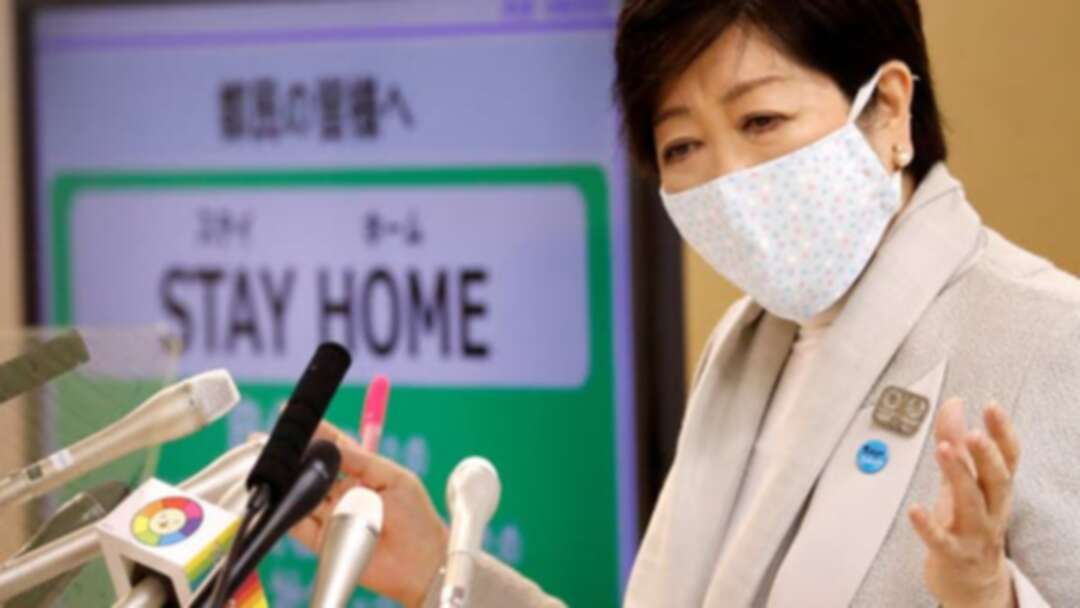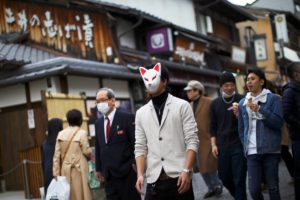-
Japan’s modern, ancient capitals to tighten coronavirus restrictions

Tokyo will ask a range of businesses to close during a month-long emergency to fight the new coronavirus, the governor of the Japanese capital said on Friday, as the ancient capital Kyoto warned of spreading contagion and urged tourists to stay away.
Tokyo Governor Yuriko Koike had been feuding with Prime Minister Shinzo Abe’s government over what businesses should shut during the emergency, highlighting Abe’s desire to minimize fallout for a struggling economy and fueling concerns that his measures are too little, too late.
Koike told reporters late on Thursday she and Economy Minister Yasutoshi Nishimura had reached an agreement, and she is expected to hold a news conference on Friday.
The governor will stick to her plan to ask a range of businesses, including pachinko parlors and internet cafes, to close and restaurants to shorten their hours, but bowed to central government pressure to keep department stores, home-furnishing centers and barbershops open, public broadcaster NHK said.
“It’s about protecting lives ... so I think Tokyo residents understand the need to act quickly,” Koike told reporters, adding she wants the measures to take effect on Saturday.
Abe declared the emergency on Tuesday for Tokyo and six other prefectures, but the details of how life would change in the Japanese capital had to be hammered out intense inter-governmental talks.
Abe’s move came after a jump in coronavirus cases in Tokyo sparked concern that Japan was headed for the sort of explosive outbreak seen in many other countries.
The number of cases in Japan rose to 5,548 on Thursday, with 108 deaths, NHK said. Tokyo accounted for 1,519 cases, heightening concerns about sluggish action.
Other regions are now clamoring to be included in the national emergency.
The governor of Aichi in Japan’s industrial heartland, which hosts Toyota Motor Corp, was to declare its state of emergency on Friday and has asked to be added to the government’s targeted regions. Gifu in central Japan was also poised to issue an emergency declaration, media said.
Chief Cabinet Secretary Yoshihide Suga said on Friday that experts consulted by the government had not recommended that other regions be included in the emergency.
Kyoto tells tourists to stay away
The governor of Kyoto prefecture and the mayor of the ancient capital also asked to be included, while urging tourists to stay away from its famous palaces, temples, and gardens.
“I call on all people who love Kyoto and tourists from all over the world - until this situation is ended, to protect yourself and your families, please refrain from visiting Kyoto,” Mayor Daisaku Kadokawa told a news conference.
 Kyoto. Reuters_1556734752_RC2CKF9YAD1P_RTRMADP_3_HEALTH-CORONAVIRUS-JAPAN
Kyoto. Reuters_1556734752_RC2CKF9YAD1P_RTRMADP_3_HEALTH-CORONAVIRUS-JAPANSome experts fear the feud between Tokyo and the central government could undermine Abe’s goal to cut person-to-person contact by 80 percent to slow the pace of the pathogen’s spread.
“The tension between Koike and the cabinet will damage the impact of the (emergency) declaration,” said Kenji Shibuya, head of the Institute for Population Health at King’s College, London.
“There is zero chance of achieving 80 percent.”
Koike, once seen as a possible future premier, had pressed Abe to declare a state of emergency sooner and made clear she wanted to quickly ask a range of businesses to close.
In late March, she warned Tokyo could face a full “lockdown” if infections surged, although Japanese law does not mandate penalties for residents who refuse to stay home or businesses that stay open.
Abe has stressed Japan’s state of emergency is not a lockdown, and critics say he is sending a mixed message that confuses residents as well as businesses. Koike will also create a fund for businesses that meet her requests to close, NHK said. Abe has rejected calls to compensate such businesses in a 108 trillion yen ($993 billion).
source: Reuters
You May Also Like
Popular Posts
Caricature
BENEFIT Sponsors BuildHer...
- April 23, 2025
BENEFIT, the Kingdom’s innovator and leading company in Fintech and electronic financial transactions service, has sponsored the BuildHer CityHack 2025 Hackathon, a two-day event spearheaded by the College of Engineering and Technology at the Royal University for Women (RUW).
Aimed at secondary school students, the event brought together a distinguished group of academic professionals and technology experts to mentor and inspire young participants.
More than 100 high school students from across the Kingdom of Bahrain took part in the hackathon, which featured an intensive programme of training workshops and hands-on sessions. These activities were tailored to enhance participants’ critical thinking, collaborative problem-solving, and team-building capabilities, while also encouraging the development of practical and sustainable solutions to contemporary challenges using modern technological tools.
BENEFIT’s Chief Executive Mr. Abdulwahed AlJanahi, commented: “Our support for this educational hackathon reflects our long-term strategic vision to nurture the talents of emerging national youth and empower the next generation of accomplished female leaders in technology. By fostering creativity and innovation, we aim to contribute meaningfully to Bahrain’s comprehensive development goals and align with the aspirations outlined in the Kingdom’s Vision 2030—an ambition in which BENEFIT plays a central role.”
Professor Riyadh Yousif Hamzah, President of the Royal University for Women, commented: “This initiative reflects our commitment to advancing women in STEM fields. We're cultivating a generation of creative, solution-driven female leaders who will drive national development. Our partnership with BENEFIT exemplifies the powerful synergy between academia and private sector in supporting educational innovation.”
Hanan Abdulla Hasan, Senior Manager, PR & Communication at BENEFIT, said: “We are honoured to collaborate with RUW in supporting this remarkable technology-focused event. It highlights our commitment to social responsibility, and our ongoing efforts to enhance the digital and innovation capabilities of young Bahraini women and foster their ability to harness technological tools in the service of a smarter, more sustainable future.”
For his part, Dr. Humam ElAgha, Acting Dean of the College of Engineering and Technology at the University, said: “BuildHer CityHack 2025 embodies our hands-on approach to education. By tackling real-world problems through creative thinking and sustainable solutions, we're preparing women to thrive in the knowledge economy – a cornerstone of the University's vision.”
opinion
Report
ads
Newsletter
Subscribe to our mailing list to get the new updates!






















